Athens may appear a little rough around the edges at first, but the Greek capital gets a lot more interesting when you look under the surface. Of course, Athens is steeped in ancient history, so even if you’re on your way to the Greek islands for some sun and fun, it’s highly worth spending a couple of days in Athens.
From the iconic Acropolis, to the vibrant street markets, and the mouthwatering Greek cuisine, this first timer’s guide to the Greek capital will help you plan your trip with the best things to see and do in Athens.
Contents
- Best things to do in Athens
- 1. Explore the Plaka neighborhood
- 2. Visit the Acropolis
- 3. Visit the Acropolis Museum
- 4. Take a graffiti tour of Athens
- 5. Stroll around Monastiraki Square
- 6. Visit the National Archaeological Museum
- 7. Sample the food at a Greek taverna
- 8. Go beyond ancient Greece at Benaki Museum
- 9. See the changing of the guards
- 10. Head to the islands on a boat tour
- 11. Hike up to Philopappos Hill
- 12. Shop like a local at Varvakios Agora
- 13. Learn how to cook like a local
- 14. Explore the world of Cycladic Art
- 15. Get around by the Metro
- 16. Retreat to the green of The National Gardens
- 17. Explore the outer neighbourhoods
- 18. Catch a beautiful sunset in Athens
- Tips about visiting Athens
DISCLOSURE: This post contains affiliate links. If you make a purchase via one of those links, I will earn a commission at no extra cost for you.
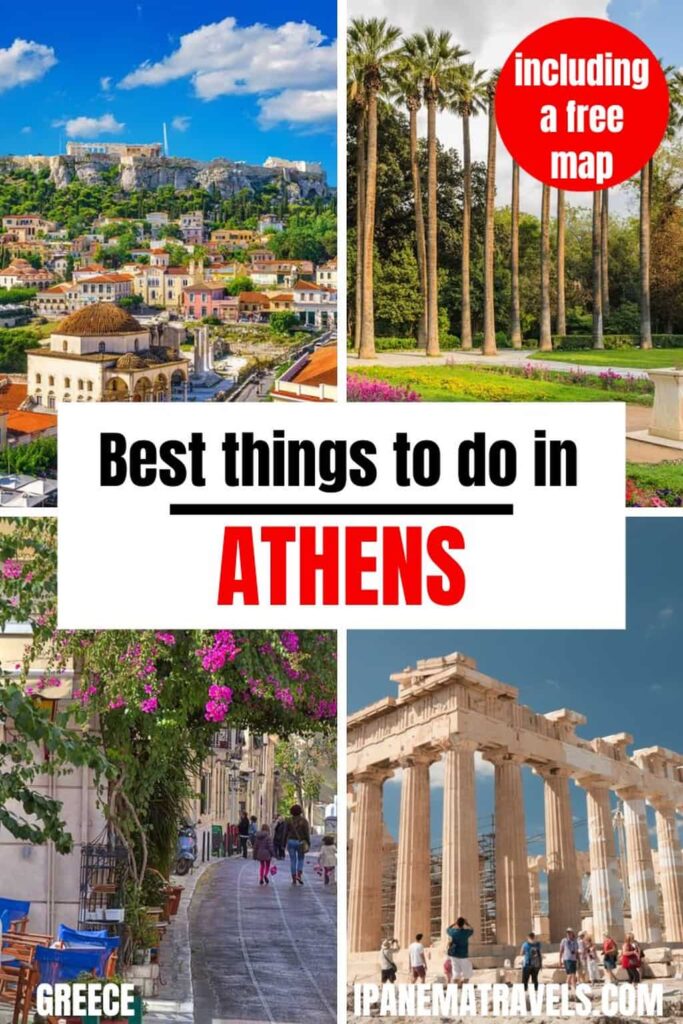
Best things to do in Athens
So, here are the best things to do in Athens for every first-time visitor. You can save the map to your Google maps, so that you have all locations marked when you are walking around.
1. Explore the Plaka neighborhood
If it’s your first time in Athens, it’s nice to start in Plaka to get your bearings. It’s also a good area to book your hotel as it’s very central.
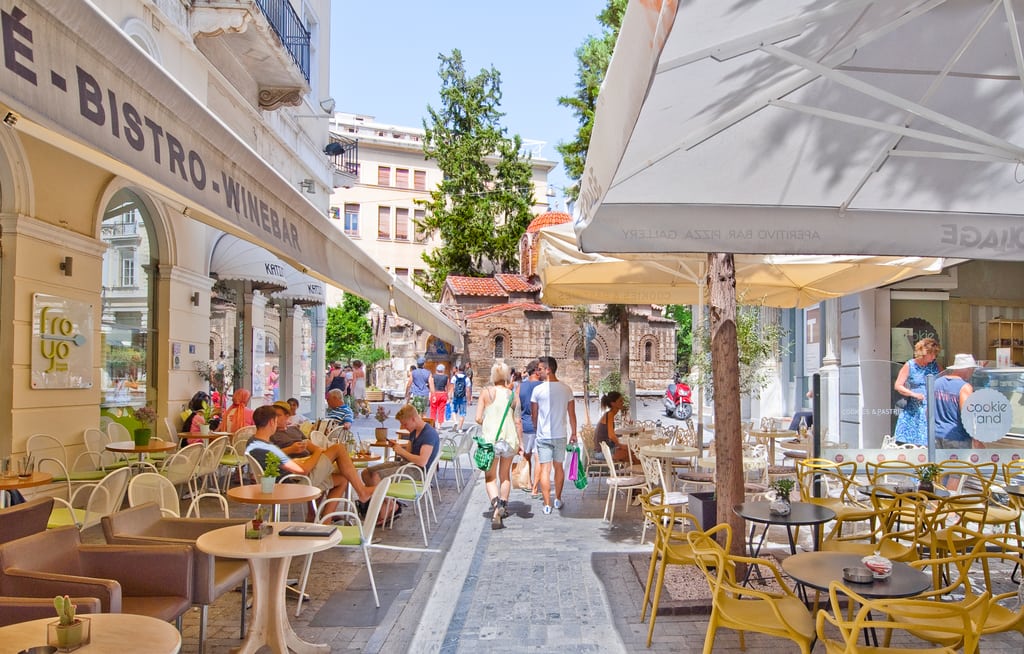
It’s the center’s most photogenic neighborhood, thanks to its friendly cafes and tavernas, cobbled steps, and shaded squares. Hugging the slopes of the Acropolis and largely free of motorized traffic, it has an almost Greek-island vibe.
This is Athens’ oldest district, the area having been continuously inhabited for over 3000 years, though much of the architecture has a neoclassical or Ottoman character.

Take your time to explore the narrow streets lined with sidewalk cafes, then climb your way up to the adjacent Anafiotika neighborhood, with its cute whitewashed houses with vines and bougainvillea flowers.
Plaka is a neighborhood full of shops, restaurants, and cafes that’s well worth exploring on foot.
2. Visit the Acropolis
The Acropolis of Athens is literally unmissable, as you’ll see it perched atop the Hill of the Muses from many of the streets down below. A UNESCO World Heritage Site and one of the most popular tourist attractions in all of Europe, The Acropolis is easily at the top of anyone’s Athens bucket list.
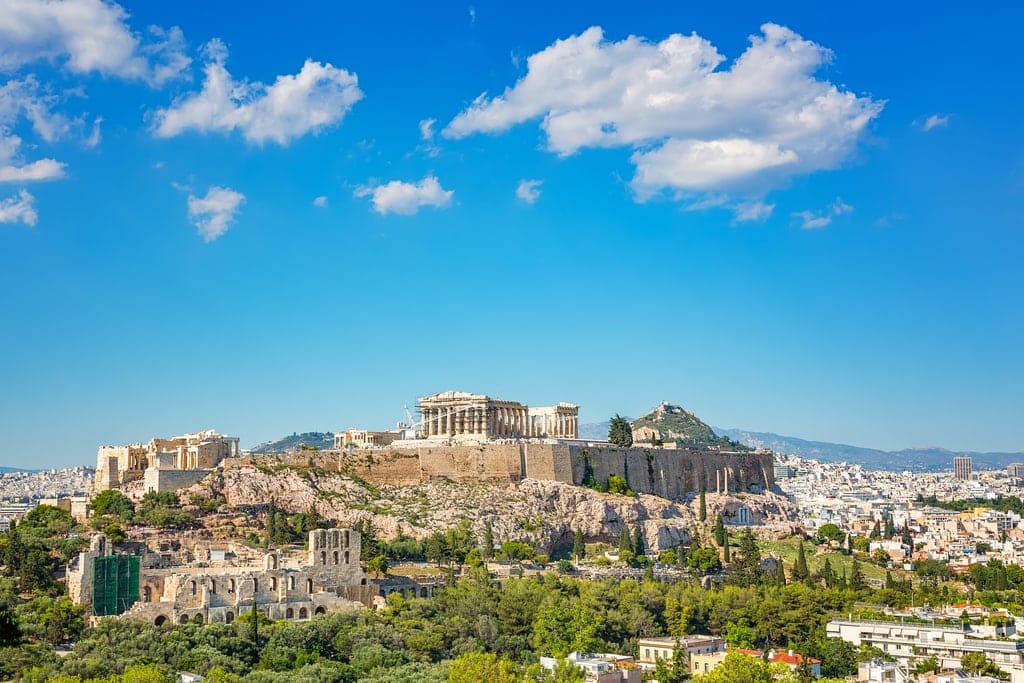
It’s from this ancient citadel that Athens (and Greece) were once governed. The site is home to many ruined temples, most importantly the majestic marble temple of Parthenon, which is dedicated to the goddess Athena.
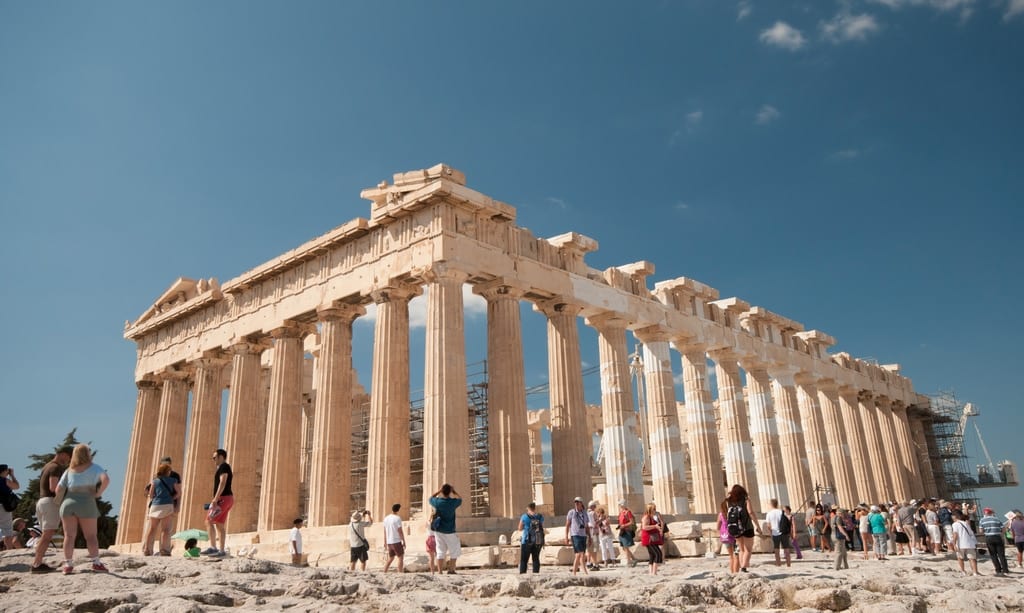
Tip: It can take several hours to see everything at the Acropolis. Consider a guided tour to truly get the full experience. This 2-hour guided Acropolis tour (small group) includes admission plus a professional art historian guide.
It’s a great idea to tick the Acropolis off the list on your first day, as it’s easily Athens’ most epic sight.
However, if you’re visiting at the height of summer, try to leave it for the morning or the end of the day, as there is barely any shade and the sun can be brutal at midday.
Practical info
Address: Acropolis District, 105 58 Athens
Admission fee: adults – 21 EUR, EU under 25 yoa – free of charge; non-EU 6-25 yoa – 10 EUR. You can buy a combination ticket that includes the Acropolis and other archeological sites (34 EUR)
Opening times: April-August, from 8 am till 8 pm; September-March, from 8 am till 6:30 pm (closing time varies as of beginning of September through the end of October)
3. Visit the Acropolis Museum
The Acropolis ruins and the Acropolis Museum are actually two separate sights in Athens. The museum is in a modern building on the south slope, about a 20-minute walk from the Acropolis itself.

It’s here that some of the most prized sculptures and other works of art are stored. It opened in 2009 and now houses over 2500 artifacts from the archaeological site that were collected from various excavations since the 19th century.
Besides the artifacts, the museum also gives further insight into the history of the site. At its entrance, there is a model of ancient Athens, which really gives you an idea of how it looked 2000 years ago.
Practical info
Address: Dionysiou Areopagitou 15, 11742 Athens
Admission fee: Summer: adults – 15 EUR, EU under 25 yoa – free of charge; non-EU 6-25 yoa – 10 EUR; Winter: adults – 10 EUR, EU under 25 yoa – free of charge; non-EU 6-25 yoa – 5 EUR
Opening times: Summer (April-October): Monday, from 9 am till 5 pm, Tuesday-Sunday, from 9 am till 8 pm, Friday, from 9 am till 10 pm; Winter (November-March): Monday-Thursday, from 9 am till 5 pm, Friday, from 9 am till 10 pm, Saturday-Sunday, from 9 am till 8 pm
Website: www.theacropolismuseum.gr
4. Take a graffiti tour of Athens
Many first-time visitors to Athens are surprised by how gritty it can be outside the Acropolis area. It’s true, Athens is not always the most beautiful city and if you’ve come to expect to see only classical buildings and cozy historical streets, you may end up a bit disappointed, as this is limited only to a small area.
But this also presents an opportunity to get to know some of the unique aspects of modern Athens, such as its vibrant graffiti and street art culture!

Athens is filled with art everywhere you turn your eyes. You can see some on your own while you explore the city, but if you want to learn more, consider joining a Greek street art and graffiti tour.
There are quite a few companies offering this experience and they will show you around some of Athens’ best street art. You’ll learn a lot about the city’s street art culture and see parts of the city that you wouldn’t have seen otherwise.
Tip: Book this street art tour to learn about the urban culture of Athens.
5. Stroll around Monastiraki Square
Be sure to stroll the streets in central Athens as you’re sure to find many cozy cafes and interesting shops, especially near Monastiraki Square and on Ifestou walking street.
The Monastiraki Flea Market which gets recommended a lot is sadly not a real flea market, but there are many Greek souvenir and art shops in this street that are fun to browse. There are shops selling jewelry, clothes, and local ceramics, as well as typical Greek liqueurs and brandies.
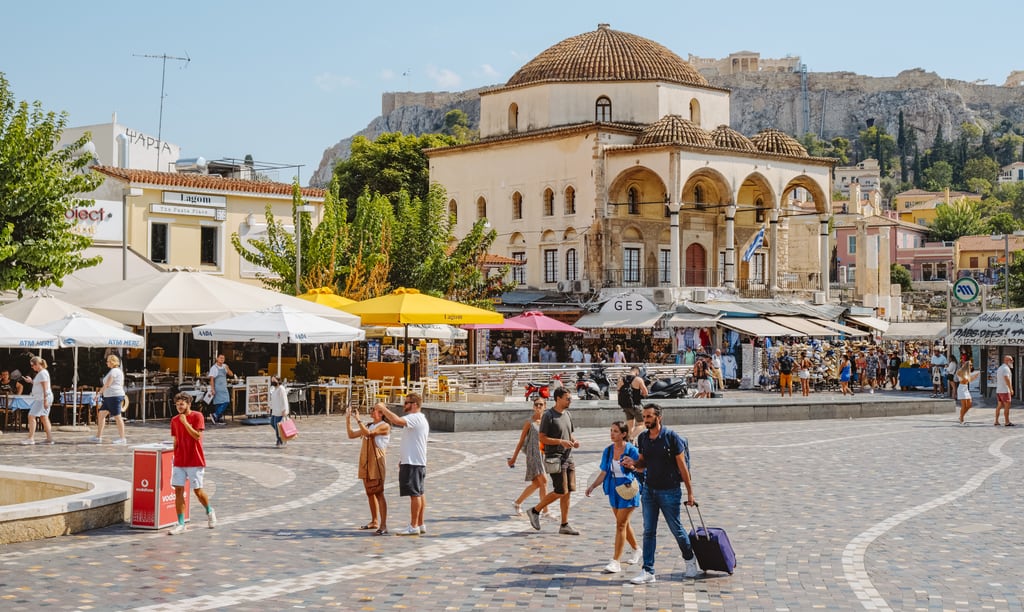
While you’re here it’s nice to pick up some gifts or some Greek products to take home. Last time I stocked up on some bottles of Mastika, a highly distinct liquor from the island of Chio, which is made from the resin of a mastic tree. I love this stuff and have never been able to find it sold anywhere at home!
Even if you’re not buying anything, it’s fun to stroll through Monastiraki Square, where you’ll find street performers and plenty of people mingling around souvenir stands and markets.
6. Visit the National Archaeological Museum
Housing some of the most impressive artifacts from ancient Hellenic and Prehistoric times, the National Archaeological Museum will show you an incredible progression of ancient Greek art through all of the eras. As you go through each room, you can see the style evolves.
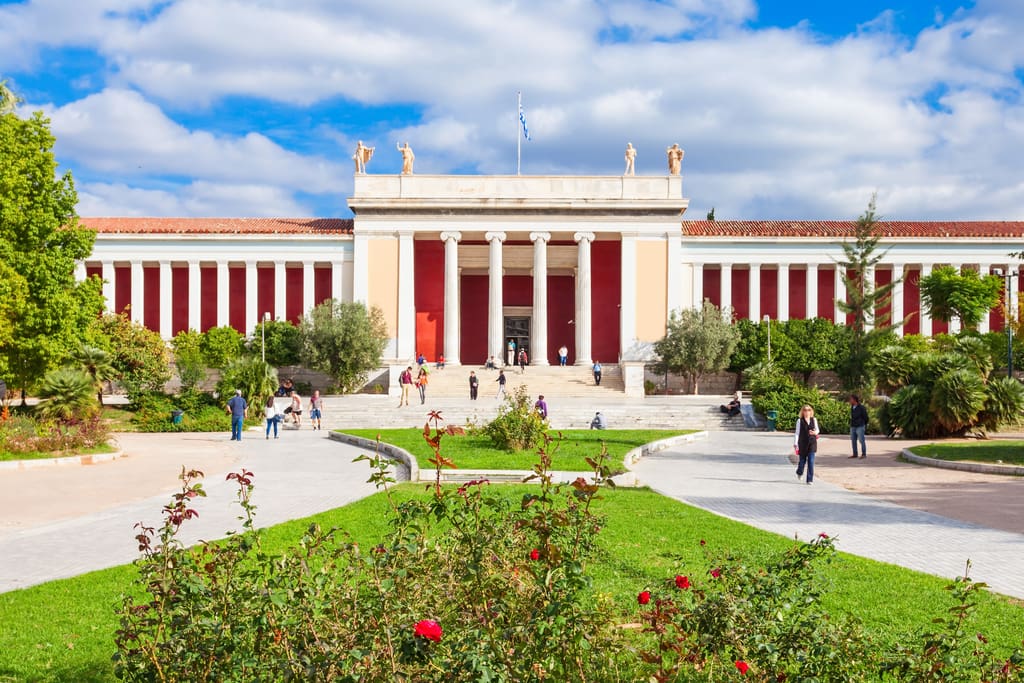
Besides the incredible sculptures and vases, you can see the exhibit on the Antikythera mechanism, an analog computer dating somewhere between 87 and 205 BC. Invented by the Greeks, the knowledge of this insanely advanced technology was lost and not seen again in human civilization for over a thousand years.
The Antikythera mechanism is truly awe-inspiring; if you haven’t heard of it, check some videos on it on YouTube and you’ll be amazed this was invented two millennia ago. It as a manual orrery used to predict the position of the celestial bodies and the eclipses in advance.
A quick visit to the museum will take at least 2 hours while an in-depth visit can easily take 4 hours.
Practical info
Address: 44, 28th of October (Patission) str., 10682 Athens
Admission fee: April-October: 12 EUR, November-March: 6 EUR
Opening times: April-October: Tuesday, from 1 pm till 8 pm, Wednesday-Monday, from 8 am till 8 pm; November-March: Tuesday, from 1 pm till 8 pm, Wednesday-Monday, from 8:30 am till 3:30 pm
Website: www.namuseum.gr
7. Sample the food at a Greek taverna
One of the best things about Greece is clearly the food! A big part of eating out in Athens are the tavernas – the name for typical local restaurants. There are literally thousands of them dotted around the city. They’re where Athenians go to socialize, drink and eat and spend hours over their meals.

Although this area is very tourist-oriented, a great place to start your evening would nevertheless be in Plaka. This is thanks to its wealth of cute restaurants, many of them with seats along the stairs outside, or with rooftop terraces overlooking the Acropolis. The atmosphere is simply lovely.

It’s the perfect chance to try out some typical Greek dishes, such as moussaka (a layered casserole dish with potatoes and minced meat), dolmades (stuffed grape leaves), spanakopita (phyllo pastry spinach pie), traditional souvlaki (skewers with grilled meat), or authentic Greek tzatziki.
8. Go beyond ancient Greece at Benaki Museum
The Benaki Museum might not be the first thing to do in Athens – that would definitely be the Acropolis Museum – but I may have enjoyed it just as much.

It covers ancient Greece in great depth, but also many of the later eras of Greek history. You’d almost forget it… but a lot more happened after the Hellenistic Period. I loved seeing the collection of Byzantine art, usually typified by its gold, red, and blue colors.
While the classical Greek period always steals the show as this is what everyone is most familiar with, there is much more to Greek (art) history, which is on full display in the highly varied Benaki Museum.
Practical info
Address: 1 Koumbari St. & Vas. Sofias Ave., 10674 Athens
Admission fee: full: 12 EUR, reduced: 9 EUR
Opening times: closed on Tuesdays; Monday, Wednesday, Friday, Saturday, from 10 am till 6 pm; Thursday, from 10 am till 12 pm; Sunday, from 10 am till 4 pm
Website: www.benaki.org
9. See the changing of the guards
Visit the Changing of the Guards at Syntagma Square and see how the military soldiers parade in front of the Greek Parliament, near the Tomb of the Unknown Soldier.

The traditionally dressed guards stand proudly in perfect stillness in front of the Hellenic Parliament until they are relieved by the next shift every hour in the day.
On Sundays at 11 am it’s particularly worth witnessing, as this changing of the guards involves an official ceremony.
10. Head to the islands on a boat tour
Feel like you’re taking your own Homeric Odyssey and book a boat tour around the islands outside of Athens. Enjoy a day cruise around the Saronic Islands just south of the city. Excursions typically leave around the Marina Zeas and will take you out of the city and into the Mediterranean.

Tours around the island of Agristi with its pine-covered hills and aqua blue waters make a perfect stop-off point to explore while Aegina Island and Moni’s translucent waters make a great opportunity to jump in and cool off or grab lunch on the beach.
Recommended trips:
11. Hike up to Philopappos Hill
Tucked away from the more obvious tourist sights in Athens is this natural park south of the old center. A great little hike will take you to Philopappos Hill, which overlooks the Saronic Gulf and offers a breathtaking view over Athens.
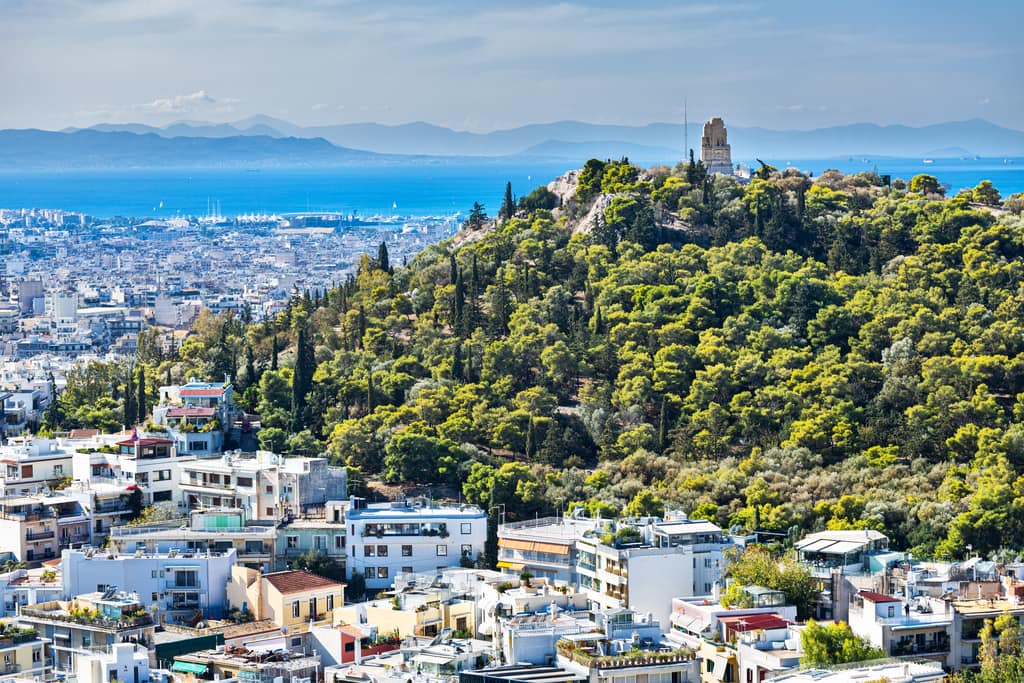
It’s named after a wealthy Roman who bought this place from a prominent Athenian family in order to build his own house here and enjoy this beautiful view.
This area has some lovely walking paths among the pine tree forests. Just be sure to water if you’re doing this at the height of the summer as it does require a bit of a climb to reach the best viewing point.
12. Shop like a local at Varvakios Agora
Going to the Agora is a Greek tradition as old as Greece itself. In ancient times it not only served as a place to shop and trade, but it was also a place to meet people, make deals, and even sometimes discuss politics.
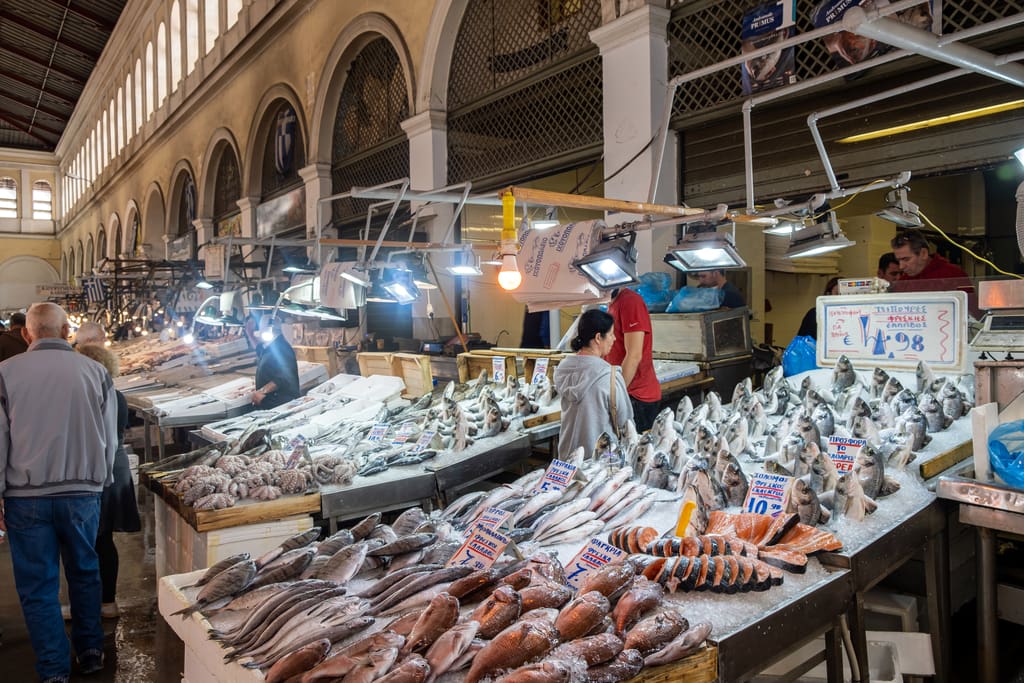
The Varvakios Agora, the Central Municipal Market in Athens, takes the best of the Agora ethos and brings it to the modern age. It’s the local hub of all things shopping and has been an Athenian staple since the 19th century.
The place is huge and is a cornucopia of sights, smells, and sounds. Fresh fruit, meat, and vegetables are in abundance but you’d be amiss if you didn’t check out the local spice traders, exotic tea sellers, and artisanal honey makers.
13. Learn how to cook like a local
No trip to Athens is complete without learning to cook some of the local delicacies. Local guides and home cooks can help out with your culinary adventure.
Whether you’re an experienced cook or not, learning how to cook Greek food from a local is an experience you’ll remember for a while. Stroll through the local market, pick up a few key ingredients and learn how to cook dolmades, spanakopita, tzatsiki, or orange pie.

Recommended experiences:
- Food Market Visit and Cooking Class with Wine – 4 hours
- Greek Cooking Lesson & 3-Course Dinner – 4 hours
- Greek Cooking Class, Market Visit and Lunch – 4 hours
- Greek Phyllo and Pie Cooking Class – 3 hours
14. Explore the world of Cycladic Art
While it’s true that there is no shortage of museums in Athens, especially ones that cater to ancient Greece, the Museum of Cycladic Art is a little bit different.
It started in the 1960s by a private couple who over time collected one of the world’s largest collections of prehistoric art from the Cycladic Islands and the Aegean region. By the 1980s, they finally opened a museum and by 1986, it became one of the largest exhibitors of ancient Greek art not only from the mainland but also from the islands and Cyprus.
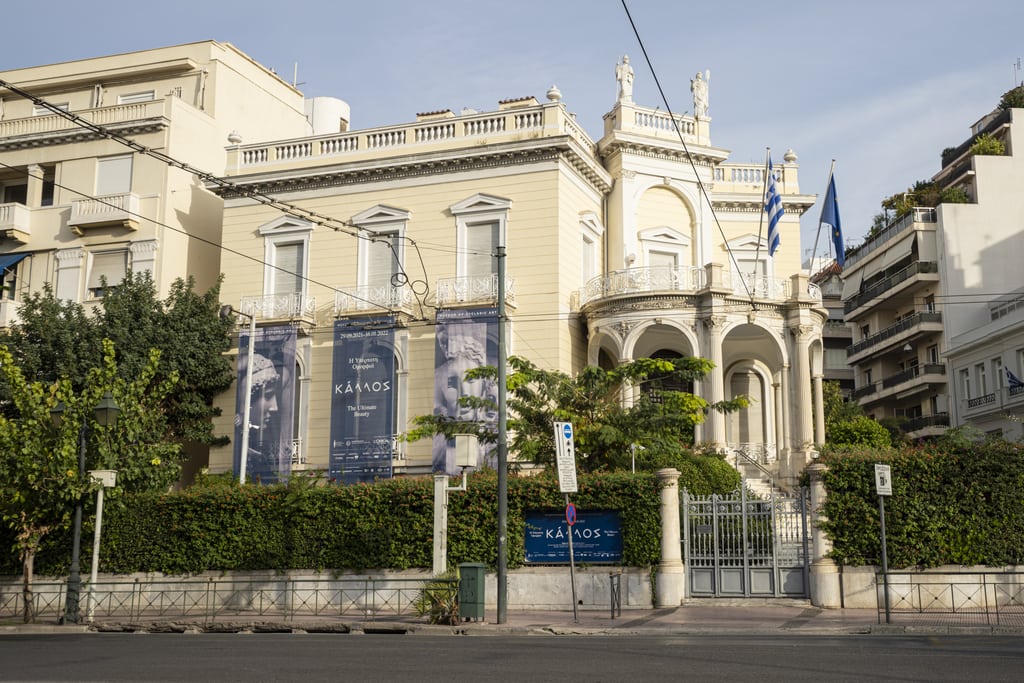
The art ranges from the 4th millennium BC to 4th/6th century AD and the Cycladic marble figurines on display here are amongst some of the favourites by art historians and visitors alike.
Practical info
Address: Neofitou Douka 4, 10674 Athens
Admission fee: full: 12 EUR, reduced: 9 EUR
Opening times: closed on Tuesdays; Monday, Wednesday, Friday, Saturday, from 10 am till 5 pm; Thursday, from 10 am till 8 pm; Sunday, from 11 am till 5 pm
Website: cycladic.gr
15. Get around by the Metro
While walking through Athens is a great way to see and experience the hustle and bustle of daily life, getting from point A to point B sometimes requires more than just a walk. If you decide to take the metro, be sure to take notice of your surroundings while you do so, because the Athens metro has something unique about it.
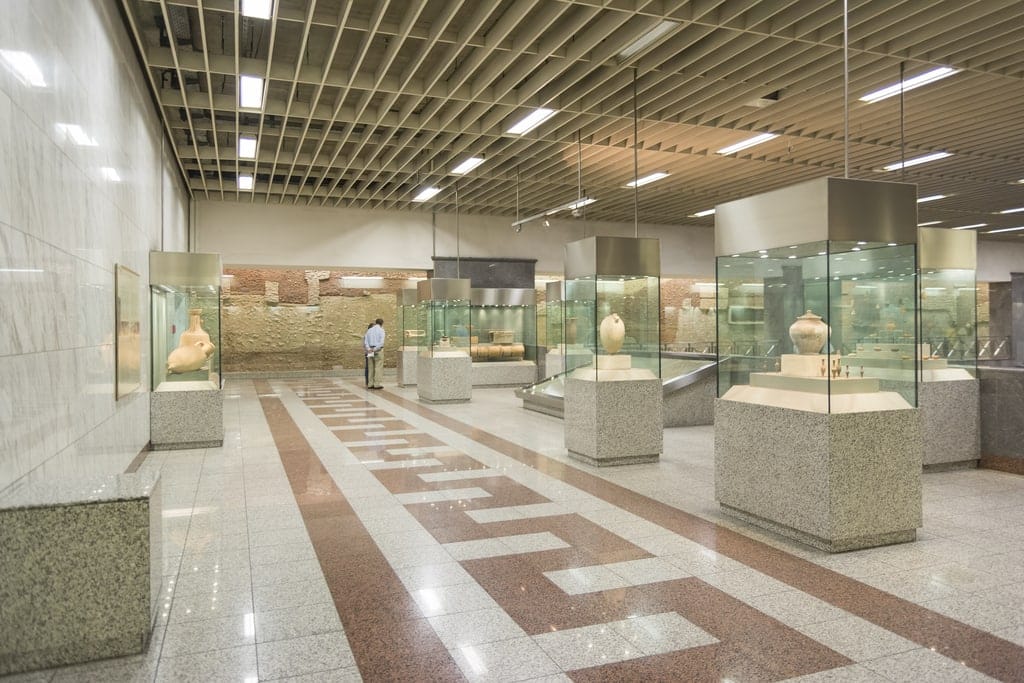
Stations in some parts of the city are veritable museums, especially the ones around the famous Syntagma Square.
In an effort to modernize the city, Athens built a metro system in the early 90s but due to the sheer age of the city, you couldn’t dig a hole without hitting something of historic value. Engineers worked alongside archeologists to bring a modern metro while also preserving found artifacts. Now the metro system doubles as a museum with artifacts found while digging for the metro on display.
16. Retreat to the green of The National Gardens
Located right in the heart of Athens, The National Gardens are a beautiful green space right in the middle of the bustle of the city. Located behind the Greek Parliament building, the gardens take up a whopping 15.5 hectares (38 acres) of space right in the heart of the city. The gardens were commissioned by Queen Amalia in 1836 and completed in 1840.

Spend some time strolling through the gardens, admiring the ponds, the numerous statues, or even check out the little on-site zoo filled with peacocks, chickens, and Greek goats. The National Garden is a great little retreat in the shade away from the sun and the noise.
A walk through the park combines well with a stop at the ruins of the Temple of Olympian Zeus, or the aforementioned Benaki Museum.
17. Explore the outer neighbourhoods
Athens is a huge city and a big tourist destination so the city center is almost always full of tourists. If you’re looking for a more “local” experience, you just need to head out of the downtown area.
The Athenian suburbs might seem like a boring prospect to explore at first, but what you’ll find outside of the city is good food at more affordable prices and a slower pace of life.
The Glyfada neighbourhood on the southern edge of the city offers beaches, nightlife, and restaurants, all with a distinctly local Athenian vibe.
18. Catch a beautiful sunset in Athens
Before you say goodbye to Athens to see other places in Greece, give the city one last lingering look at sunset.
You can catch a fantastic view from one of the rooftop bars in Monastiraki. Most guides seem to recommend the 360 Cocktail Bar, though I went to the rooftop bar in the A for Athens Hotel, which I thought has a better angle on the Parthenon.

You can also catch an amazing view of the city from Mount Lycabettus, a block or two from the tourist center. There is a cable car that can take you to the top for a great vista of the Acropolis and the glittering waters of the Saronic Gulf behind it. Have a cocktail at one of the bars or bring your own bottle and sit on the steps. The sunsets are incredible.
Tips about visiting Athens
Athens is highly worth visiting, but first impressions aren’t everything! If you’re not charmed right away, it might grow on you soon. It’s a mostly modern city with a small historical core.
Most tourists prefer staying in the lovely areas of Plaka, Monastiraki or Koukaki.

The best time to visit Athens is really any time outside of August, as this is the busiest (and hottest) time of the year. I love Athens in the low season when it’s less hectic. In August, consider visiting the air-conditioned museums during the hottest time of day.
The ruins of the Acropolis and Parthenon are not half as good without a proper guide! I say this having done it with and without a guide. I recommend this Acropolis guided tour as it will truly speak to your imagination and bring the old ruins to life.
About the Author
Marek Bron is the author of Indie Traveller – an independent travel blog for independent travellers that focuses on backpacking, road tripping, ecotourism, and cultural trips. His best tips and experiences Marek has collected in the book ‘Travel the World without Worries’.
